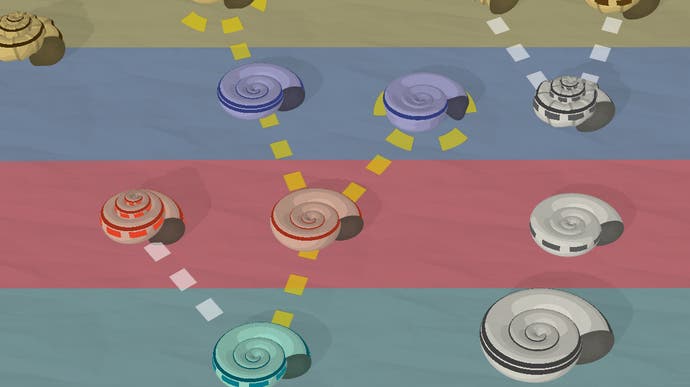Make a home for yourself and your fossils in chill PC puzzler Fossil Corner
"Everyone who I've encountered who's played this game has been really sweet… I feel pretty lucky for that.'
"Fossils are aesthetically beautiful, and I love them for being physical reminders of the long history of life on this planet. Holding them makes me feel connected to the past."
These are the words of Brady Soglin, whose boyhood love for fossils took him to places ranging from Mazon Creek, a swampland sixty miles from his native Chicago, to Solnhofen, a Bavarian geological hotspot. A long-term hobby, he intertwined it with another - creating games - to form PC puzzler Fossil Corner, my favourite chill hidden gem of 2021. There's much I like about the game, and much that piqued my interest, so I decided to delve into Fossil Corner and its origins by interviewing its spectacled, bearded, bald twentysomething solo developer/publisher. Why make a game about fossils anyway?
"I wanted to make a game that was about a person who was very interested in something that was niche," Soglin tells me over Google Meets. "Someone focusing very hard on something that most people would be like 'huh like why do you care so much about [this]'."
Fossil Corner sees you as a retired palaeontologist 'processing a crisis of faith'. You spurn a cruise ship getaway to continue doing what you love, which is using your shed to collect fossils. The puzzles come in the form of boxes. Open up a box and as soon as up to 12 fossils are poured onto a multi-coloured canvas, you need to sort and form links between them to construct a family tree (or trees). Links are made between pairs that have a sole characteristic 'trait' change, like a fossil adding features or mirroring, and after all is linked you'll receive a monetary reward, as well as a pick of any member from the set to add to your collection. Most boxes will be littered with tat, much like real life I'm told (a lot of 'poop' to be found), but finding that one shiny in a box can make your day.
What's really captivated me is the nature of it all, an easygoingness seemingly emanating from Soglin himself. His aim was for a "casual relaxed game with a lower barrier to entry," a sedateness that's very much part of the pastime it echoes. From what I gather fossil hunting is much like gardening - the harvest is complemented by the overall calm experience. That essence is captured well here. Boxes have no time limit and no penalties for mistakes. Instead, you'll find a page highlighting what to look out for and an unlimited hint button, which gleefully bobs fossils to point you in the right direction. You can also freely flit to and fro between things, allowing you to manage tasks at your own pace.
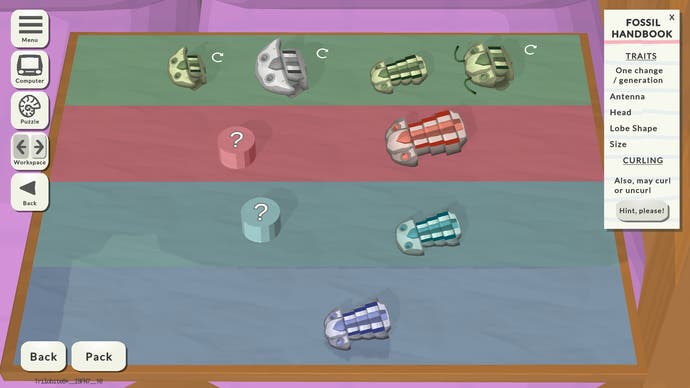
Starting in an empty workspace, you slowly unlock more furniture to hold your accrued items. Most are used practically to house things, but some are ornamental, and everything's easily placed with a simple drag and drop (I wish fitting furniture was as easy in real life). Honestly, there's great pleasure in gradually bringing the barren walls you're presented with to life, slowly transforming the space into something you can call home. It's the small things that make it that way, like the editable signs you can hang to leave yourself nice (or quirky) messages, and the plants you can put to liven up the place.
These plants are likely a nod to Plant Daddy, a similarly soothing game Soglin released in 2020 where you tend to blossoming plants. Although in Plant Daddy you merely buy the plants, Fossil Corner is its natural successor as the two games share the space management theme. "What I ended up settling on, was essentially just taking Plant Daddy, that first game I made with the interior design, and kind of wrapping the puzzle mechanic in the shell of the Plant Daddy system," says Soglin, while simultaneously wrapping an open palm of one hand over the clenched fist of his other. That's something to note about him, he often uses of masterful motion to convey his ideas, perhaps more frequently than he realises.
He also laughs often, a joke here and there (puzzles were made easy enough to be solved 'while stoned').This is carried across to Fossil Corner's minimalistic story. Told through an in-game PC, you'll read often humorous emails from various parties, most of which will ask for pictures of certain fossils, and as you only ever see their side of the conversation it's up to your imagination to fill in the blanks.
The game has some other neat features too, though I'm equally fascinated by some of the work that's been done behind the scenes. Soglin, a Computer Science major, rewrote Plant Daddy's code to make it more efficient for Fossil Corner, and sought out a specialist academic paper to model shells, one of the game's three fossil types. "Essentially, to model a shell you define a curve, and trace the shape of the opening of the shell down the curve," Soglin says, while using his fingers to map out the curve. "As you move down the curve, the edges of the shell's opening become its walls. It's an actual mathematical formula and there's a series of equations that can create the shell."
"It's a pretty fascinating procedure, especially because it mimics the way animals actually grow their shells in the real world. The thing that I like most about making games is finding natural systems that I think are really interesting and finding ways to replicate them."
The other two types are trilobites and crinoids. Both hold special significance to Soglin, as trilobites are his favourite fossil type and he has fond memories searching for crinoids on the beaches of his beloved American Midwest. They're modelled in a similar manner, "a little bit less realistic than the shells because [they] are more complex organisms,'' so he had to ''make a lot of simplifications."
"It's much less equations and more like taking pieces I 3D modelled and assembling them in different combinations," Soglin explains. "I used Blender and made a bunch of parts, then I wrote an equation that switches them out and changes out how they're combined, then I wrote another thing that assembles a finished 3D model."
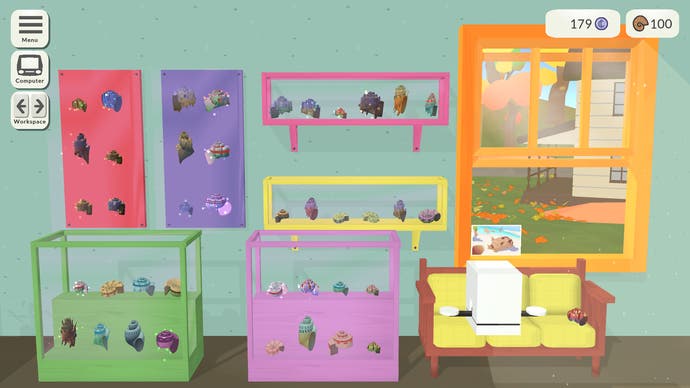
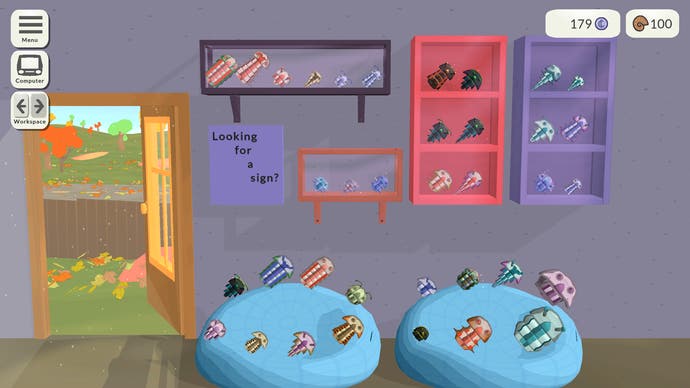
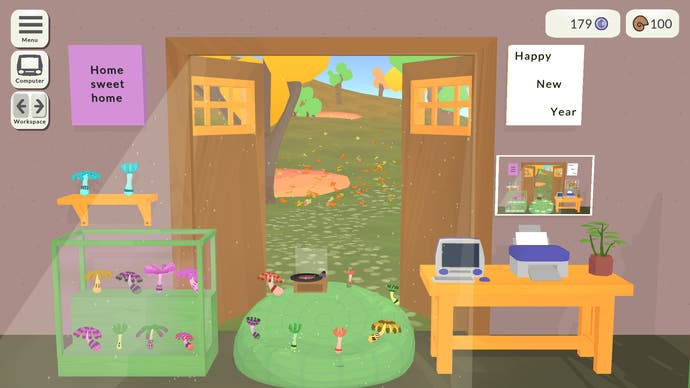
There's science behind things as well. Shiny fossils come in three forms - opalized, agatized and pyritized - that are representative of "replacement", an actual fossil mineralisation process, while the puzzle boxes reflect real-world principles, such as stratigraphy for the layers and maximum parsimony for the trees. Some players have taken notice, with overwhelmingly positive Steam reviews that have moved Soglin himself. He communicates with several via his Overfull Games Discord server (named after his LLC), where the game seems to bring out the best of people. "So far everyone who I've encountered who's played this game has been really sweet. They are understanding when there are problems with the game, and they're kind to each other," he says. "I feel pretty lucky for that."
Look further and you'll find a two-word phrase woven into Soglin's games - procedural generation. In Fossil Corner a number of things are procedurally generated, including the difficulty of the puzzles (after a number threshold), the structure of the familial tree (or trees) and the appearance and traits of each individual fossil in each box. "I just love procedural generation", admits Soglin, who plays roguelikes in his free time. "I think of the feeling of exploration if a procedurally generated [game] is done well, you feel like there's this openness there and this possibility there that is pretty exciting."
Soglin entered Plant Daddy into 2019's ProcJam, an annual two week event focused around this games design method (something previously been covered by Eurogamer), and his love for it has only grown since. "You can run into some really unusual, kind of emergent things when you're playing a procedurally generated game," he says. "When I think about the kind of stuff that I'm interested in seeing in a game, it appeals to me a lot to run into something that's new and potentially quite strange that hasn't been precisely planned out. Or maybe has been precisely planned but that isn't visible to me."
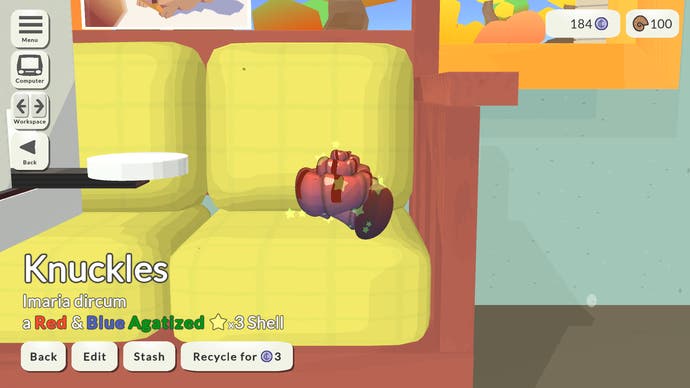
"I probably will always make procedurally generated games," Soglin adds, as we finish speaking with a look to the future. He tells me he hopes to take loved ones fossil hunting again (when it's safe to do so), not before he sums up Fossil Corner in his own words. "Fossil Corner is a game about wasting your time and doing nothing in the game, and you're doing it because you want to and that's fine."
And that's the thing: to most these rocks from the ground mean nothing, but to Soglin they mean something, and once you play Fossil Corner they mean something to you too. You're encouraged to parade your findings, earning a bonus score per box for having more fossils on display, and Soglin took delight in showing me members of his own real life collection he keeps an arm's length away.
You get a sense that this is your space and these are your fossils. Rename them, crossbreed them to find rarer ones, take pictures of them to fill scrapbooks. Once the story is done you'll even unlock a printer, letting you decorate the walls with your own in-game pictures. Of all the weird and wonderful worlds gaming has taken me to this year, this is the most grounded one - it is only a shed after all, and for a smaller game with a brief story, it's provided me several hours of pleasant time. I think as the days grow colder and the nights grow longer, I might return here every now and then, and perhaps, if like me you're looking for something stress-free, you might find something here too.
